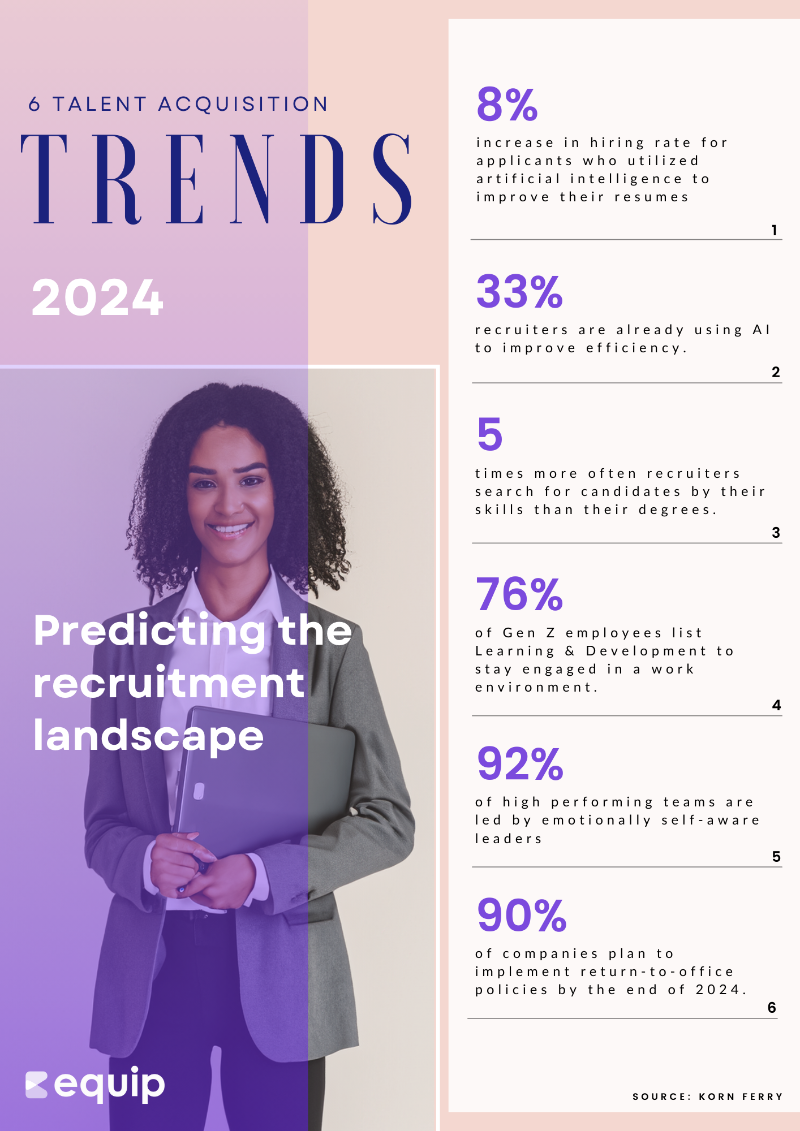
2023: The year that turned talent acquisition on its head and said, "Who needs a rulebook anyway?"
Top three trends in talent acquisition in 2023 were:
- The Flexibility Revolution: The buzzclamor for flexible work options reached fever pitch in 2023, forcing recruiters to rethink their traditional, office-bound roles.
- The Rise of Internal Mobility: Companies started to recognize the goldmine of talent already sitting at their desks, leading to a renewed focus on internal promotions and development programs.
- The Reign of Skill-based Hiring: Skills like adaptability, problem-solving, and business acumen became hot commodities, leading recruiters to incorporate these into their hiring assessments.
In this blog post, we're going to dive into the top six talent acquisition trends that are set to reshape the recruitment landscape in 2024. Why should you care? Because staying informed isn't just an edge in our fast-paced industry - it's an absolute must.
A Glimpse into New Trends in Talent Acquisition for 2024

Talent Acquisition Trend #1: AI and Recruiters - Teaming Up in Finding Talent
In the fast-evolving recruitment landscape, a cautious yet promising alliance is forming between AI and recruiters, revolutionizing the way talent is acquired. Recruiters are increasingly leveraging AI to streamline processes and enhance efficiency. From crafting compelling job descriptions to automating sourcing, AI is bringing a new level of precision and personalization to the recruitment process.
Despite the transformative potential of AI, recruiters remain aware of the inherent risks. Concerns around data privacy, algorithmic bias, and the need for human oversight have been noted. However, the consensus within the industry is clear: the benefits of AI greatly outweigh the risks. As we advance into 2024, the challenge lies not in whether to adopt AI, but in how to balance its use with the irreplaceable human touch in recruitment.
Talent Acquisition Trend #2: Candidates Implementing AI for Job Hunting - Positives and Pitfalls
Candidates today are increasingly turning to AI to enhance their job search experience. This trend has seen AI being used to tailor resumes, draft cover letters, and even find openings for roles that candidates may not have previously considered.
While this might raise some concerns for recruiters, they should view it as an opportunity rather than a threat.
Firstly, the use of AI by candidates can vastly expand the talent pool. Since AI can efficiently uncover job opportunities that may not be immediately apparent, it can lead to a more diverse range of applicants.
Secondly, AI's ability to optimize resumes and cover letters means that recruiters will receive applications that are more closely aligned with the job requirements, saving them valuable time in the screening process.
However, it's important for candidates to tread cautiously. As AI advances, so do the techniques employed by scammers. Candidates must be vigilant to avoid falling prey to AI-generated fake jobs and should always ensure they're interacting with verified companies or platforms.
Talent Acquisition Trend #3: A Shift Towards Early Career Hiring
There's a noticeable increase and shift in the approach toward early career hiring. Recruiters are now engaging with potential candidates even before they complete their college education.
This proactive strategy offers numerous advantages to recruiters. or one, recent graduates typically command lower salaries compared to experienced professionals, providing a cost-effective solution for businesses. Additionally, early career hiring allows for the cultivation of company-specific skills and knowledge from the ground up, which can lead to increased loyalty and reduce turnover in the long run.
To prepare this young workforce for the professional world, organizations are implementing comprehensive training programs. These initiatives equip the new hires with the specific skills required for their roles and also reinforce essential soft skills like communication, teamwork, and problem-solving.
A key component of this early career hiring approach is skill assessment. By evaluating the skills of candidates early on, recruiters can expedite the hiring process. It helps in identifying the most suitable candidates who not only meet the technical requirements but also align with the organization's culture and values. Thus, this emerging trend is revolutionizing talent acquisition, making it more efficient and targeted.
Talent Acquisition Trend #4: Hiring for Skills
A key driver behind skill based hiring is the increasing demand for talent that currently outweighs supply. Evidence from numerous sources, including LinkedIn and ISO Talent, indicates that the demand for highly skilled workers, particularly in sectors such as technology and cybersecurity, significantly outpaces the available talent pool. In fact, Gartner predicts that this demand-supply gap in tech talent will persist until at least 2026.
In response to this talent scarcity, recruiters are pivoting towards a skill-based hiring approach. This strategy allows companies to tap into a broader talent pool, including self-taught individuals and those seeking career transitions. It also enables employers to identify candidates who possess the necessary competencies and the ability to learn and adapt, which are critical in today's rapidly evolving business environment.
Moreover, this approach aligns with the increasing emphasis on lifelong learning and the recognition that a traditional degree may not always be the best predictor of job performance. Thus, hiring for skills is emerging as a viable and effective solution to the ongoing talent crunch.
Hiring for niche skills for interim roles is an effective strategy to navigate the current talent landscape. From the organization's perspective, hiring interims with niche skills often fills a gap in their existing skill set. Therefore, it's essential to have a streamlined recruitment process, possibly a shorter 1 or 2 stage process, to optimize access to interim talent.
Talent Acquisition Trend #5: Empathy Reigns Supreme
The importance of empathy in the workplace is emerging as a critical trend in talent acquisition and retention. Empathy, defined as the capacity to understand and share the feelings of others, is increasingly recognized as a vital leadership quality. For instance, consider a scenario where a team member is unable to meet a project deadline due to a personal crisis. An empathetic manager would understand and accommodate their situation, offering extensions or assistance, rather than strictly adhering to the deadline.
Empathetic leaders can connect with their team on a deeper level, foster a more inclusive environment, and better understand the needs and challenges of their employees.
A lack of empathy can adversely affect employees, leading to decreased morale, lower productivity, and higher turnover rates. Employees are more likely to stay with an empathetic employer. Conversely, a lack of empathy can lead to disengagement and dissatisfaction, which can significantly impact a company's bottom line.
In the context of recruitment, empathy plays a crucial role in understanding candidate needs and expectations, creating a positive candidate experience, and ultimately attracting and retaining top talent. Recruiters who demonstrate empathy can build stronger relationships with candidates, leading to increased trust and engagement. As such, integrating empathy into talent acquisition strategies not only benefits employees but also contributes to a healthier and more productive workplace culture.
Talent Acquisition Trend #6: Return to Offices
The COVID-19 pandemic ushered in a significant shift in the workplace dynamic, with remote work becoming the norm for numerous businesses around the world. Employers quickly realized the benefits of remote work arrangements, such as reduced overhead costs and increased employee satisfaction. However, as the world begins to adjust to a post-pandemic reality, many employers are asking their employees to return to the office. 90% of companies plan to implement return-to-office policies by the end of 2024.
This change signals a potential resurgence of job relocations. Employees, who had enjoyed the flexibility and convenience of working from home, are now faced with the conundrum of whether to relocate closer to their workplaces or seek other remote-friendly opportunities. This situation could lead to a talent reshuffling across industries and geographies.
However, recognizing the challenges and potential disruption associated with a full return to the office, many companies are exploring hybrid work models as a middle ground. These setups, which combine remote and in-office work, aim to balance the need for collaboration and face-to-face interaction with the flexibility that employees have come to value during the pandemic. Such an approach could alleviate some of the pressure on employees while still meeting the organizational needs of businesses.
Summarising Talent Acquisition Trends for 2024
1. Recruiters expected to incorporate AI for hiring while being wary of its any risks associated with biases creeping into implementing AI for recruitment
2. Candidates' using AI for job search will widen the talent pool for recruiters
3. Early career hiring will take precedence when hiring budgets are tight. Skills will be more prevail work experience.
4. Recruiters will hire for skills which will open opportunities for self-learners, career transitions and upskilling
5. Leadership and Talent Acquisition will focus on empathising with potential and existing employees to retain them long-term
6. Increasing shift to employees returning to offices
This article is a summarised version of Korn Ferry's Talent Acquisition Trends 2024.

